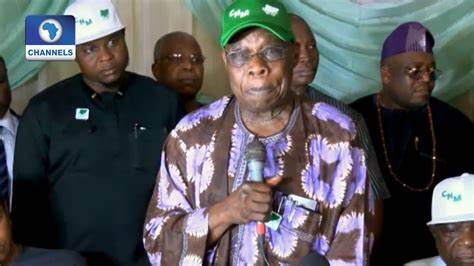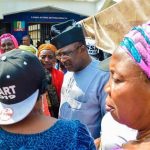I voted for President Obasanjo in the 1999 General Elections. In my view, given the combination of factors arising out of the deep crisis that Nigeria’s military dictators had foisted on our country, Obasanjo was the candidate who had the nationalist pedigree to pull Nigeria together. I just could not imagine that Nigeria’s presidency was going to be handed over to the Afenifere candidate, Olu Falae; the group was in real terms dedicated to a platform of ethnic restructuring of Nigeria that stood contrary to everything that the history of our country, even from pre-colonial times, had taught us. The overwhelming endorsement of Obasanjo, especially in Northern Nigeria, was related to this same perception that he came to the job with a near impeccable credential as an ex-head of state who understood the complexity of Nigeria, had the experience of his past performance and would therefore find the sensitivity and commitment to pull the country together on the not-easy path of democratic transition. In the euphoria to end years of military dictatorship, with hindsight, it seemed that Nigerians did not factor in a lot of issues into the transition to civil rule. I think looking back now, we did not realise how much of manipulation was actually built into the transition process by the military cabal, whose main interest was not the Nigerian people’s urge for a better life in a democratic society, but the preservation of privileges they had illegally extracted in the years of dictatorship. The Obasanjo candidacy and eventually, presidency, was therefore not a free agent at work for the Nigerian people, despite the posturing by the man himself, and the alliance of military cabal and political elite that sponsored him into power. Of course, I am not by this assessment questioning the genuinely idealistic hopes of some members of the nation’s political elite, such as Chief Sunday Awoniyi, who saw the People’s Democratic Party, PDP that they formed as the platform to create a new, inclusive and patriotic political culture for Nigeria. The most dominant tendencies in the PDP government from the beginning were not really those that shared visions of a new political culture that works for the Nigerian people; but the alliance of the military cabal and the elite which saw politics as an avenue for the entrenchment of their tendency for accumulation of wealth and power, became much stronger than the idealists. It did not take long for them (the idealists) to be sidelined. The open manipulation of the PDP convention to ensure that Chief Awoniyi did not get to become the party’s national chairman was the hallmark of the new direction the party and the country would be taking. On top of this pile of negatively unpatriotic politics rode a President Obasanjo who was brought to power totally without any vision worthy of solving the complex problems that Nigeria had accumulated under military dictatorship. As a matter of fact, President Obasanjo brought to the presidency a very heavy baggage of negative attributes that would distort his rule in the years to come: the bitterness he felt over his imprisonment; an ill-digested intellectual posturing that made him assume he had answers to all problems; an urge for revenge misdirected at all sorts of enemies, real or imagined; a shop-worn bullying tactic that cowered subordinates but did not extract the best advice or genuine affection for or loyalty to the president and therefore devaluing the service to a country that was badly in need of genuinely dedicated husbandry. We have therefore lived through the years of the Obasanjo presidency lurching from one avoidable problem to the other. The political party system has been largely destroyed by years of military dictatorship and such self-serving projects of banning and unbanning politicians and the so-called creation of “new breed” political elite, especially by General Ibrahim Babangida. The commandist and authoritarian traditions of military dictatorship were therefore carried to a grotesque level by General Olusegun Obasanjo, whose intolerance of other opinions went along with a rudeness that was unacceptable in the president of a complex country like Nigeria. At the base of these subjective inadequacies was also a constitutional order drawn up by the departing military dictators, but which were packed full of booby traps aimed to explode with the intention of scattering the entire civil democratic transition process. The stresses and the strains have been curtailed much more by the fears associated with the known consequences of the failure of the democratic project and the real possibilities of a return to military rule than any special consideration for the norms of a democratic culture by the political elite. There is a regrettably mercenary proclivity at the heart of the nation’s political culture today. The legislature is consciously emasculated by a President Obasanjo who fancies himself as the state (l ‘etat c ‘est moi!), and is consequently disdainful of the checks and balances associated with democratic politics. He exploits the mercenary instinct with the deployment of “Ghana must go” on the one hand, and the cane of blackmail and bullying tactics on the other. These unacceptable affronts to constitutional rule by the executive have exposed the inherent weaknesses of the 1999 Constitution and have made democracy such a difficult proposition in the Nigerian setting. The constitution is full of provisions that concentrate too much power in the presidency; this might not even be as negative in the hands of a more restrained individual. But in the hands of Obasanjo, we have seen the very worst elements of a presidentialism that is wielded by an individual with a very tall ego. What makes Obasanjo’s unrestrained ego so unacceptable is the level of his incompetence as a leader. The hope that he was brought to power to heal wounds and bring people together has unfortunately been frittered away by the man’s incapacity for genuine empathy for the people he leads, his brusque dismissiveness of others and his generally insensitive attitude to people and occasions, and there are so many examples to draw from. In drawing up an agenda for a post-Obasanjo Nigeria, it has become very important therefore for Nigerians to draw useful lessons from the very negative experience of being ruled by President Obasanjo. The man dashed our hopes; expended all the goodwill that built a path for him to power; began to imagine himself as the messiah that Nigeria had longed for; has been a disaster as a ruler; is an enemy of constitutional order; fancies that he can continue in power against our will through the manipulation of the same constitutional processes he has often treated with contempt and has turned full circle to become a danger to the nation’s democratic process. Nigeria must never allow itself to be manipulated again, especially by the military cabal, whose only game is to continue to keep ahead of everybody in their mortal fear of retribution by the Nigerian people for all the years of wasteful and illegal leadership, of the squandering of the nation’s potential for greatness and the avoidable pains of hare-brained economic policies that have left Nigeria in ruins. We must therefore work out a new agenda that insists upon a genuinely democratic choice of leaders at all levels, but especially of a president who possesses genuine democratic credentials. It is imperative to remind us all that outstanding individuals don’t appear in a vacuum. All of us are proud of Nelson Mandela’s personal and moral qualities. A few even wished that Obasanjo could become Nigeria’s own Mandela. However, how many of us remember that the Mandela phenomenon of qualitative leadership was nurtured within the progressive political movement of the ANC, the South African Communist Party, the Congress movement and the crucible of the national liberation struggle? That movement tempered the individual characteristics of Nelson Mandela and his comrades, and the Mandela we all love cannot be appreciated or understood outside of the discipline and collectivism of the political movement which has its roots in generations of activists and their sacrifices since the founding of the ANC in 1912. Obasanjo does not possess the edifying personal qualities of NelsonMandela; he has never learnt the discipline of a serious political movement and could not rise beyond the limitations of his origins and acculturation in the patriarchal settings of peasant, colonial and neo-colonial military commandism. The trajectory of Nigerian politics has been quite different. Historically, the more militant tendencies rooted in the trade unions and the more left-wing politicians have often provided the mass base for political agitations, but power was often won by the more conservative political elite. But in recent years, there developed a more consensual gathering at the centre of politics, which was what characterised the political process that ended military rule in 1999. It is this kind of consensus building that is emerging today to challenge the Obasanjo dictatorship and the agenda to manipulate the constitution to achieve the third term project. This process must be programme-led. We must create a minimum national programme to rescue the nation’s democratic process; it must be an anti-dictatorship programme with a strong commitment to work for a genuinely democratic constitution-making process. Such a process cannot be like the kangaroo process currently being fashioned out with the main agenda of perpetuating Olusegun Obasanjo in power against the wishes and best interests of the Nigerian people. Constitution-making processes, when genuinely attuned to the needs of the people, should be done in an open and transparent manner, taking in the yearnings of the Nigerian people in such a way that the political elite that would work to implement the constitution would serve rather than be the bosses of the people. This need for inclusiveness is the reason why popular social forces must engage with and interrogate the political elite at the same time in the present phase of the struggle to defeat the Obasanjo clique. The irreducible minimum for a genuinely democratic society is to have in place, and on an incremental basis, the deepening of the freedoms available to the Nigerian people through the implementation by governments freely elected by the Nigerian people, not governments manipulated into office and kept in power by the massive fraud of electoral malpractices. Such governments operate as if the people don’t matter; and in real terms, the people don’t really matter, since the government is in place against the wishes of the people. Let us work hard, collectively, to ensure that Obasanjo’s government will be the last that will come into power against the wishes of the Nigerian people.
AN AGENDA FOR A POST-OBASANJO NIGERIA (I)


